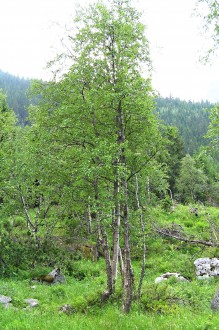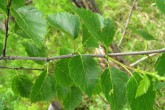(Betula carpatica Waldst. et Kit.)
Habitus
- it is a shrub to a small tree, grows up to 8 m in height
- morphologically it is very similar to the white birch (Betula pubescens)
- bork is typically multi-layered, peeling, usually whitish-gray, gray, brown to dark brown
Shoots
- typical is the formation of up to 5 cm long, twisted brachyblasts
Leaves (assimilation organs)
- leaves are simple, 2.5 - 6.5 x 2.5 - 5.0 cm in size, rhombic to ovate, leathery
- 2 - 4 leaves grow on brachyblasts
- tomentose on young branches, otherwise scattered hairy to bare
- the leaf petiole is 9-25 mm long and thick, with a pronounced groove on the upper side
- sawtooth to double-sawtooth edge
- venation on the reverse is significant (3 - 7 pairs of lateral veins)
Flowers
- it is a monoecious woody plant, flowers of different sexes
- ♂ catkins are established already in the fall, growing at the ends of last year's branches after 1-3
- ♀ catkins are at maturity on a 4 - 11(- 20)mm long stalk
- it's blooming in VI
Fruits – seeds
- the fruit is a winged achene 1-2 mm in size, ripens at the end of September
- the achenes are arranged in a cone-shaped proboscis
Extension
- it is a species widespread in the mountains of Europe
- in Slovakia in higher mountain locations – the High, Western and Belianske Tatras, mainly in the subalpine stage up to the zone of dwarf (Pinus mugo)
- avalanche areas, stone debris, moraines at the ends of the Tatra valleys
Ecology
- it grows in moist rocky and rubble sites on crystalline and limestone substrates
Significance
- soil protection, water retention, avalanche protection
- possible use in park landscaping (dark brown bark color)















